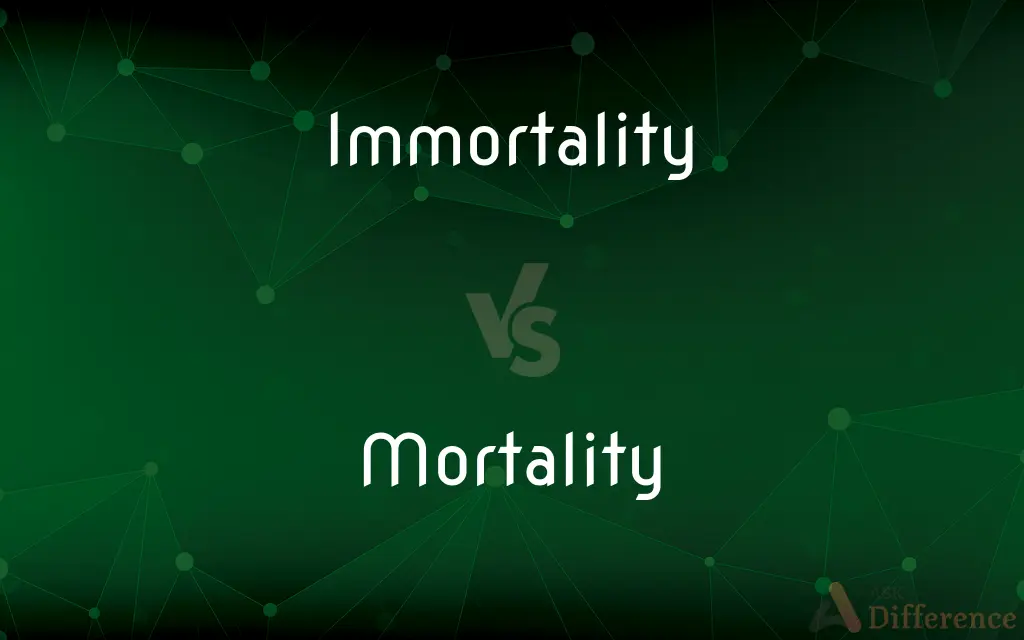Immortality vs. Mortality — What's the Difference?
By Tayyaba Rehman & Maham Liaqat — Updated on March 31, 2024
Immortality denotes endless life, exempt from death, while mortality refers to the inevitable aspect of death that affects all living beings.

Difference Between Immortality and Mortality
Table of Contents
ADVERTISEMENT
Key Differences
Immortality is the concept of living forever, without succumbing to death, a state often ascribed to deities, mythical beings, or envisioned future technologies. In contrast, mortality is a fundamental characteristic of all known living organisms, highlighting the inevitability of death and the finite nature of life. This contrast puts immortality in the realm of the eternal and unending, whereas mortality is bound by time and the natural cycle of life and death.
While immortality suggests an existence free from the limitations and decay associated with aging, mortality is closely tied to the biological processes of aging, disease, and eventual death. The pursuit of immortality, whether through mythological, spiritual, or scientific means, reflects humanity's deep-seated desire to transcend the constraints of mortality, whereas accepting mortality often involves recognizing the value and preciousness of the finite time available.
The concept of immortality raises philosophical questions about the nature of existence, identity over time, and the value of an endless life, considering potential boredom or loss of meaning. Mortality, on the other hand, is associated with the urgency to live a meaningful life, the significance of legacy, and the importance of relationships, framed by the awareness of life’s transitory nature.
In many cultures, immortality is seen as a blessing or a curse, depending on the narrative context, implying eternal youth or endless suffering. Mortality, while universally acknowledged, is perceived differently across cultures and religions, with varying beliefs about the afterlife, reincarnation, or oblivion, reflecting diverse attitudes towards death and the end of existence.
Technological and scientific advancements have reignited interest in achieving a form of immortality, through biotechnology, artificial intelligence, or other means, challenging traditional conceptions of life and death. Meanwhile, the universal experience of mortality continues to inspire art, literature, and philosophy, serving as a reminder of the common destiny of all living beings and the value of embracing life’s moments.
ADVERTISEMENT
Comparison Chart
Definition
The ability to live forever without dying.
The condition of being subject to death.
Nature
Eternal, without end.
Finite, limited by time.
Associated Concepts
Eternal youth, invincibility, endless existence.
Aging, decay, end of life.
Philosophical Questions
What is the value of an endless life?
What makes a finite life meaningful?
Cultural Perceptions
Often viewed as a desire or curse.
Universally acknowledged, varies across cultures.
Pursuit
Through mythological, spiritual, or scientific means.
Acceptance and understanding of life’s finitude.
Compare with Definitions
Immortality
Eternal existence, often in myths or religions.
Gods in many myths are portrayed as possessing immortality.
Mortality
The inevitability of death.
Philosophy often grapples with the concept of mortality.
Immortality
Theoretical concept in science and technology.
Advances in genetics may one day offer a form of immortality.
Mortality
Reflection on life’s limits.
Awareness of mortality can inspire a fuller engagement with life.
Immortality
Living without aging.
Immortality in literature often comes with the caveat of eternal youth.
Mortality
The quality of being human and finite.
Mortality is a shared aspect of all human experience.
Immortality
Immortality is eternal life, being exempt from death; unending existence. Some modern species may possess biological immortality.
Mortality
A measure of the number of deaths in a given population.
Improvements in healthcare have reduced child mortality rates.
Immortality
The quality or condition of being immortal.
Mortality
The state of being mortal and susceptible to death.
Mortality rates vary widely across different regions.
Immortality
Endless life or existence.
Mortality
The quality or condition of being mortal.
Immortality
Enduring fame.
Mortality
Mortals considered as a group; the human race.
Immortality
The condition of being immortal. Category:en:Immortality
Mortality
Death, especially of large numbers; heavy loss of life
The mortality wrought by an epidemic.
Immortality
Never dying
In Greek mythology, Tithonus was granted immortality but not eternal youth.
Mortality
Death rate.
Immortality
Being remembered forever
Mortality
The rate of failure or loss
The high mortality among family-run farms.
Immortality
The quality or state of being immortal; exemption from death and annihilation; unending existance; as, the immortality of the soul.
This mortal must put on immortality.
Mortality
The state or quality of being mortal.
Immortality
Exemption from oblivion; perpetuity; as, the immortality of fame.
Mortality
The state of being susceptible to death.
Immortality
The quality or state of being immortal
Mortality
(archaic) The quality of being punishable by death.
Immortality
Perpetual life after death
Mortality
(archaic) The quality of causing death.
Immortality
The state of being remembered forever.
Artists often achieve immortality through their timeless works.
Mortality
The number of deaths; and, usually and especially, the number of deaths per time unit (usually per year), expressed as a rate.
Mortality
Deaths resulting from an event (such as a war, epidemic or disaster).
Mortality
The number of deaths per given unit of population over a given period of time.
Mortality
(figuratively) Death.
Mortality
Mortals collectively.
Mortality
The condition or quality of being mortal; subjection to death or to the necessity of dying.
When I saw her die,I then did think on your mortality.
Mortality
Human life; the life of a mortal being.
From this instantThere 's nothing serious in mortality.
Mortality
Those who are, or that which is, mortal; the human race; humanity; human nature.
Take these tears, mortality's relief.
Mortality
The quality or state of being mortal
Common Curiosities
What does mortality mean?
Mortality is the state of being mortal, characterized by the inevitability of death.
What is immortality?
Immortality refers to the condition or ability to live forever, without experiencing death.
What are the philosophical implications of immortality?
Immortality raises questions about identity, the value of eternal life, and the potential consequences of living forever.
Can literature and art achieve a form of immortality?
Through literature and art, creators can achieve a form of immortality, as their works continue to be appreciated and remembered across generations.
Can immortality be considered a curse?
In literature and mythology, immortality is sometimes portrayed as a curse, highlighting potential downsides like eternal boredom or witnessing loved ones die.
How do immortality and mortality differ conceptually?
Immortality represents eternal life without end, while mortality emphasizes the finite nature and inevitable end of life.
Can science achieve immortality?
While science has made advances in extending life and understanding aging, true immortality remains a theoretical concept rather than a current reality.
Is immortality a common desire?
The desire for immortality has been a part of human culture and mythology for millennia, reflecting a universal wish to transcend the limitations of mortality.
How does mortality influence human behavior?
Awareness of mortality can profoundly influence human behavior, encouraging individuals to seek meaning, connection, and legacy in their finite lives.
How do different cultures view mortality?
Cultural views on mortality vary, with different beliefs about the afterlife, the significance of death, and practices surrounding mourning and remembrance.
What role does mortality play in religion?
Mortality plays a central role in many religions, shaping beliefs about the afterlife, the soul, and moral conduct in this life.
What is the difference between biological and symbolic immortality?
Biological immortality refers to living forever without aging or dying, while symbolic immortality involves being remembered or impacting society beyond one's lifetime.
Is acceptance of mortality important?
Accepting mortality is often seen as a key part of living a meaningful and grounded life, acknowledging life's limits while cherishing its moments.
How does the concept of mortality affect healthcare decisions?
The concept of mortality influences healthcare decisions, particularly in end-of-life care, ethics, and prioritizing quality of life.
How do advances in technology relate to the pursuit of immortality?
Advances in biotechnology, genetics, and artificial intelligence fuel speculation and research into extending life and potentially achieving immortality.
Share Your Discovery

Previous Comparison
Priest vs. Curate
Next Comparison
Master vs. MagisterAuthor Spotlight
Written by
Tayyaba RehmanTayyaba Rehman is a distinguished writer, currently serving as a primary contributor to askdifference.com. As a researcher in semantics and etymology, Tayyaba's passion for the complexity of languages and their distinctions has found a perfect home on the platform. Tayyaba delves into the intricacies of language, distinguishing between commonly confused words and phrases, thereby providing clarity for readers worldwide.
Co-written by
Maham Liaqat













































